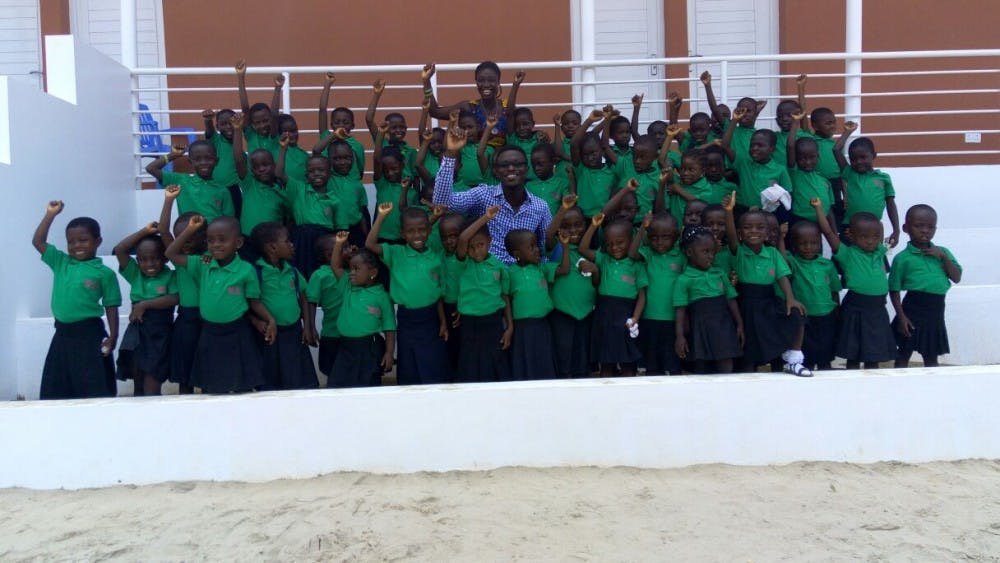Penn students weren’t the only ones resuming classes this week — the Pre-K and kindergarten students in the inaugural class of Ghana's Tarkwa Breman Girls' School began their spring term as well.
The tuition-free school and its companion community hospital were projects of 2015 President’s Engagement Prize winner and 2015 College graduate Shadrack Frimpong. The prize is a $100,000 grant from Penn to kickstart a student’s idea for a humanitarian project.
With the school open, Frimpong is now working on its financial self-sufficiency prospects. He plans to harness Ghana’s $1.9 billion cocoa industry to fund the school.
Tarkwa Breman Girls' School is adjacent to a 40-acre cocoa plantation in Tarkwa Breman, a Ghanaian farming village. Frimpong invited researchers from Google to investigate the land’s potential, and they ruled that the area could generate $69,000 annually to fund the school.
Ghanian cocoa farmers are proud of their role in their country's economy, Wharton sophomore Richard Stack said, who spent last summer in Tarkwa Breman researching the project’s local impact. He described a call-and-response chant that the government uses to rally cocoa farmers — the government says “Cocoa, Ghana!” and the farmers respond, “Ghana: cocoa!”
That’s why the school had a wealth of farmers for the plantation — Frimpong enlisted students’ parents to work one day every week.
The Tarkwa Breman community mobilized behind the school, Stack said. He added that he noticed how locals referred to it not as “the school" or “a school," but instead as "our school."
RELATED:
Gutmann announces this year's President's Engagement Prize winners
President's Engagement Prize winner brings education and healthcare to his home village in Ghana
“This is the biggest thing that has happened to their village in the last 20 years,” Stack said.
Frimpong grew up in Tarkwa Breman, without electricity and running water until his preteen years. He received a scholarship to attend an urban high school and another to attend Penn.
He wanted to fix the gender inequality he observed in Tarkwa Breman. He noticed young girls became pregnant and could not pursue the same opportunities as their male counterparts. He also saw how some fathers prioritized their sons’ educations over their daughters’.
Frimpong recognized his privilege as a male: “it’s obvious: why is that I’m the guy who was able to go to an Ivy League school?"
Stack said that although he found through his research that the same number of boys and girls are enrolled in Ghanian schools, the educational climate is more nuanced than statistics can illustrate. He relayed the local women’s belief that they must be more educated than men to receive the same level of respect. He added that men receive more scholarships, and establishing this school sends a message about the importance of women.
Frimpong used his life story as a way to raise funds, and he exceeded his goals, thanks to many Penn alumni. He was able to double his budget in 2016.
Frimpong’s project’s other half, the Tarkwa Breman Community Hospital, will open in March after the rest of its equipment donations arrive. The nearest hospital to Tarkwa Breman now is almost 4 hours away.
“Imagine having babies in taxis because there’s no health facility,” Frimpong said of the current situation.
Frimpong was a biology major at Penn. Since he believes the biggest challenge of his project — involving the community — is done, he plans to leave Ghana in 2018 for medical school. He will enlist an executive director trained in international development, who can expand on the project in ways that he couldn't.
Frimpong’s mentor, Penn Medicine professor Harvey Rubin, who also does work in Ghana, praised the President's Engagement Prize.
“That’s a wonderful thing that a president of a university can do,” he said. “You can impact a Penn student and subsequently a whole community of girls in a remote village in Ghana. [Amy Gutmann] must sleep well thinking about that."









